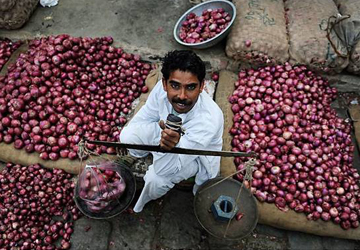New Delhi, Aug 13: The average wholesale price of onion has more than doubled since the beginning of this month and the vegetable is now selling at up to Rs 80 per kg in the city due to shortages blamed on excess monsoon rains destroying crops. Insiders in the trade say prices are not likely to reverse till around September-end . Prices are likely to stabilize this week but another surge is expected in the coming week.
Onion prices double in 2 weeks
The average wholesale price of onion has more than doubled since the beginning of this month. A massive shortage, with most of the crop destroyed due to heavy monsoon showers, has resulted in onions touching an unbelievable retail rate of Rs 80 per kg in some parts of the city.
Experts say the trend is not likely to reverse any time soon and the earliest respite can be expected around the end of September. "The maximum price for onions was Rs 55 per kg on Monday morning. We are expecting prices to stabilize this week but another surge is expected in the coming week. Stocks are depleting very fast and no new stock is coming in. This situation will remain similar till it doesn't stop raining in Karnataka . Prices may fall around end-September ," said Surendra Sahani, proprietor of Gujarat Onion Company.
A slight fall in rates across the country was observed on Monday afternoon but they picked up again by evening. "There was a downward trend in the afternoon and prices fell by Rs 2-3 per kg. However, if it continues raining in south India, prices are likely to go up again," said Rajendra Sharma, chairman of APMC.
Delhi gets its onions from three states at this time. In Maharashtra, the wholesale price of onion was about Rs 50 per kg which, when brought to Delhi, went up by Rs 5 per kg after factoring in cost of transport and other overheads. In Rajasthan, the crop is at its fag end while in Madhya Pradesh only about 15% of the crop remains. "We should have started getting onion from Karnataka by now. Some has started coming in but most of it is very poor quality due to the rain. Karnataka is buying onions from MP and Maharashtra to meet its own demand , which could have otherwise been diverted to north India if Karnataka's own produce had been good," said Sahani. Wholesale onion prices at Lasalgaon market near Nashik touched an all-time high on Monday—Rs 4,300 per quintal—and have increased 25% in three days. Nashik onions are supplied to Delhi, Mumbai, Bangalore and Pune among other cities.
This year farmers in Rajasthan planted less onions, after suffering huge losses last year. "In 2012 there was a bumper crop of onions but most of it could not be sold and farmers suffered losses. Taking a cue from that, they planted less crop this time and that has added to the shortage," said sources.
With onions averaging Rs 48 per kg in the wholesale market on Monday, it was no surprise that the average price in the retail market went up to Rs 60. But, shopkeepers charged customers as they pleased since the retail price ranged from Rs 50 in parts of east Delhi to Rs 80 per kg in south Delhi.
"Onions are a staple item in north Indian cooking and we purchase about a kilogram of onions every three days. If prices stay the same, I will have to start cooking recipes that don't need onions . The government should step in and ensure that there is at least a uniform rate across the city instead of letting vendors charge any amount they like," said Sugandha Verma of Patparganj





Comments
Add new comment